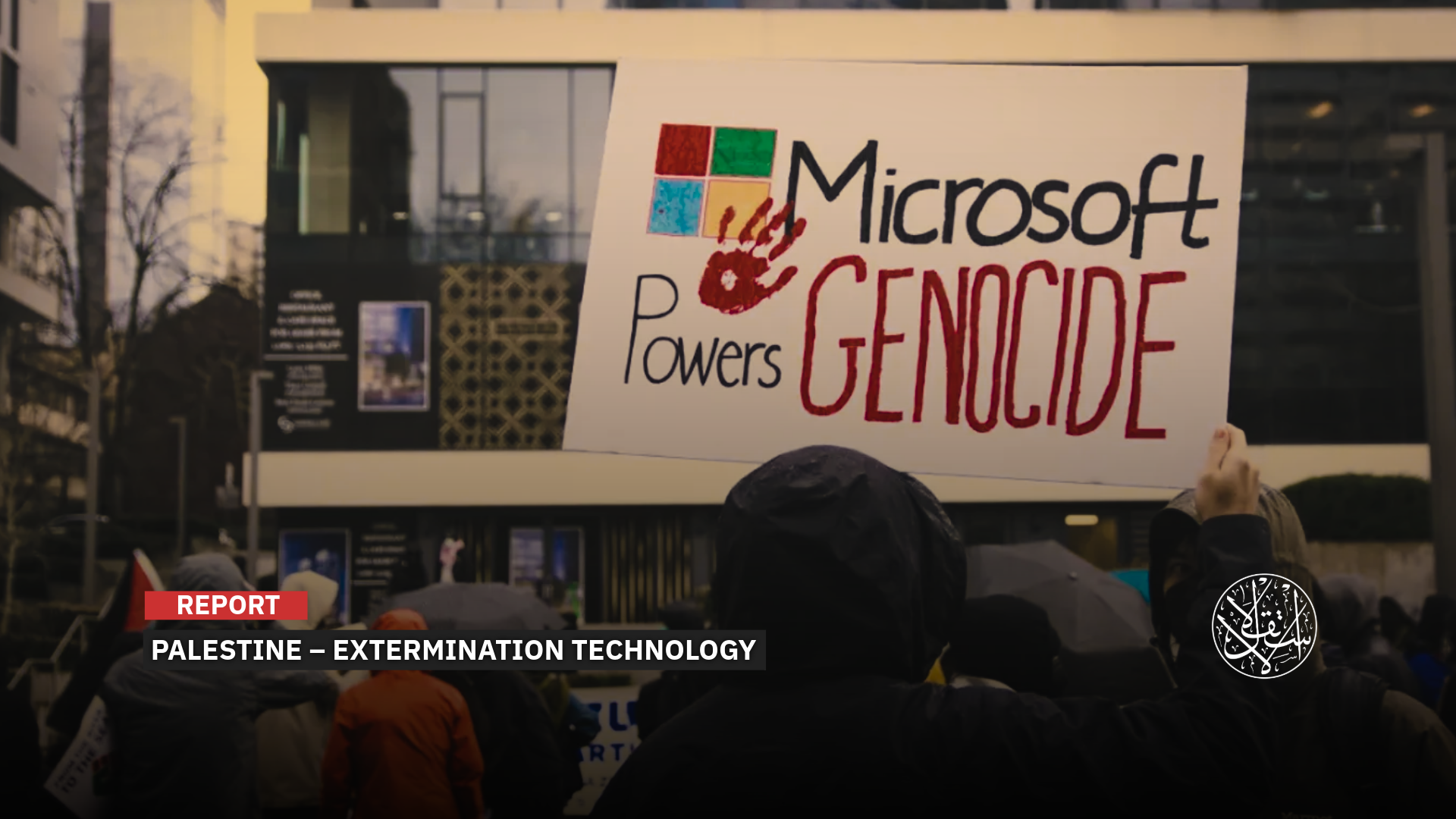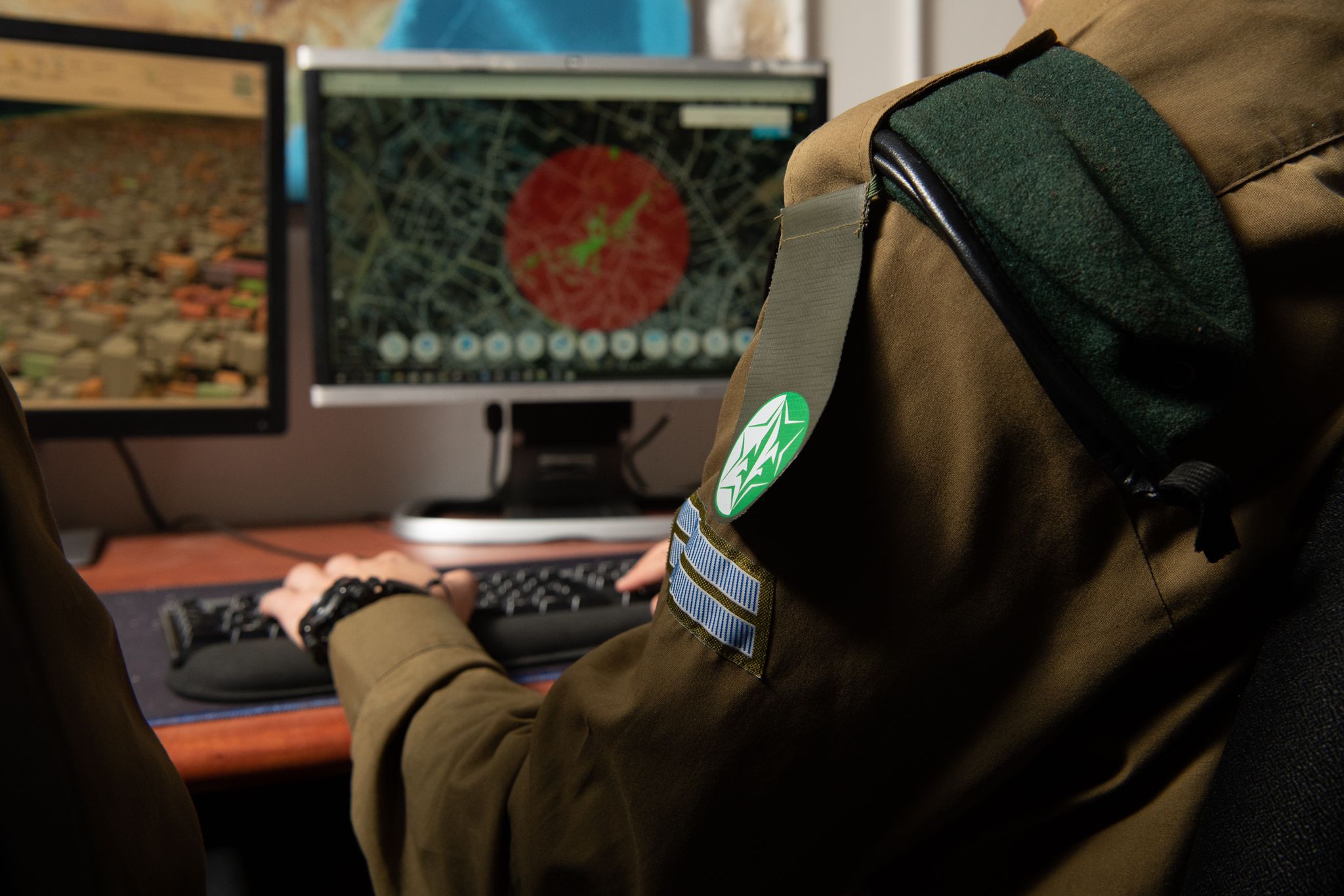How Microsoft Complicity in Israel’s War on the Palestinians

“Microsoft has a footprint in all major military infrastructures in Israel,”
In a time when data is more valuable than money, technology has transformed from a tool for progress to a means of domination.
A recent investigation revealed one of the world's largest mass surveillance operations targeting an entire population.
The story began at Microsoft's headquarters in Seattle, where advanced American technology met with the Israeli intelligence agenda to store vast amounts of intelligence on Palestinians in the occupied West Bank and Gaza Strip.
This data was not just a technical archive; it became a strategic tool for meticulously planning deadly airstrikes, formulating military operations, and arrests, in a scene that raises endless ethical and legal questions.
Dozens of units in the Israeli military have purchased services from Microsoft’s cloud computing platform, Azure, in recent months — including units in the air, ground, and naval forces, as well as the elite intelligence squad, Unit 8200.
Microsoft has also provided the military with extensive access to OpenAI’s GPT-4 language model, the engine behind ChatGPT, thanks to the close partnership between the two companies.
It has come under pressure from employees and investors due to its relationship with the Israeli military and the use of its technology in the ongoing war of extermination in Gaza.
It has also faced internal protests denouncing the company's support for what have been described as war crimes.
Azure Cloud Platform
Years ago, the Israeli military embarked on a project to store massive amounts of Palestinian phone calls on Microsoft servers in Europe.
This project, Unit 8200, part of Israeli military intelligence, is using Microsoft's Azure cloud platform, according to a joint investigation by the Guardian with the Israeli-Palestinian publication +972 Magazine and Hebrew-language outlet Local Call, published on August 6.
Unit 8200 exploited Azure's unlimited storage capacity to build a massive mass surveillance system that collects and stores recordings of millions of phone calls made daily by Palestinians in Gaza and the occupied West Bank.
Leaked documents indicate that from 2022 to July 2025, about 11,500 terabytes of intercepted Palestinian communications data were stored on Microsoft servers in the Netherlands, equivalent to 200 million hours of phone calls, in addition to additional data in Ireland and “Israel”.
According to sources within Unit 8200, this data was analyzed using artificial intelligence (AI) tools such as ‘Noisy Message’ to identify keywords that were then used to plan deadly airstrikes, military operations, and arrests in Gaza and the occupied West Bank.
A recent investigation revealed that the partnership between Israel and Microsoft began to take shape following a meeting in late 2021 between then-Unit 8200 commander Brig. Gen. Yossi Sariel and Microsoft CEO Satya Nadella.
Israel's interest in developing a mass surveillance infrastructure dates back to 2015, when Sariel was an intelligence officer.
Stabbing and car-ramming attacks in the occupied Palestinian territories by individuals unknown to Israeli intelligence made these attacks extremely difficult to thwart.
Sariel said in a book he published on AI in 2021, the year he took over as head of Unit 8200 (he resigned last year): “The solution was to start tracking everyone, all the time.”
Over the next few years, Sariel led a large-scale, well-funded project that significantly expanded Israel's surveillance of Palestinians and integrated multiple intelligence databases.
Prior to partnering with Microsoft through Azure, Unit 8200 was able to store phone call data for tens of thousands of Palestinians, but later began storing data for millions, in a project described as infinite in scale.
However, this project was not without risks. The Israeli Ministries of Justice and Finance warned that storing data abroad could expose “Israel” to legal claims in Europe related to human rights violations.

Public Protests
After the October 7, 2023, attack, the Israeli military became increasingly interested in storing surveillance data from the Gaza Strip, convinced that it would remain under Israeli control for a long time.
Microsoft saw this partnership with Unit 8200 as a historic opportunity to strengthen its brand.
Internal Microsoft documents in 2023 estimated that the partnership with Unit 8200 would generate hundreds of millions of dollars over five years, with a plan to increase the amount of data collected tenfold.
However, pressure on Microsoft increased after media reports of the use of its advanced technologies in Israel's war on Gaza.
Sixty Microsoft investors, with a combined $80 million in equity, contacted the company in July 2024, demanding a review of its monitoring and oversight mechanisms for customers misusing its AI tools.
In a highly publicized incident during the company's annual conference last May, a Microsoft engineer interrupted the company's CEO's speech and shouted, “Satya, how would you like to show how Microsoft kills Palestinians? How would you like to show how Israeli war crimes are being managed using Azure?”
In response to mounting pressure, Microsoft announced last May that a review of its relationship with the Israeli military found no evidence that Azure was used to target or harm individuals in Gaza.
Microsoft emphasized that its support was intended to enhance cybersecurity and assist in locating and rescuing Israeli hostages.
In turn, the Israeli military stated that its cooperation with civilian companies is in accordance with international law, denying that Microsoft stores or processes data for its benefit.
It's worth noting that Microsoft is facing internal opposition from its employees following the intense Israeli assault on the Gaza Strip.
The No Azure for Apartheid campaign, composed of current and former Microsoft employees, has organized several protest events.
The campaign recently asserted that Microsoft is not just a neutral tech company, but an opportunistic, profiteering partner and complicit in the ongoing genocide and apartheid against Palestinians.
It called for the Israeli military to be banned from using the Azure platform, for all company agreements with “Israel” to be disclosed, including those with arms manufacturers, and for transparent and independent audits of all Microsoft tech contracts and services.
It stressed that recent investigations have conclusively exposed the falsity of the claims made by Microsoft in its official statement issued last May.
Palestinian political analyst Dr. Husam Dajani explained to Al-Estiklal that “Microsoft's partnership with Israeli military intelligence goes beyond technical cooperation to direct complicity in a comprehensive surveillance system targeting Palestinians for arrest or killing.”
“Microsoft is now facing serious accusations of complicity in gross violations of international law and human rights, which raises doubts about the ethics of the technology industry and its use in war crimes and genocide,” he said.
He concluded that “the issue is no longer confined to political or security conflict, but has transcended to a new level of technological complicity, where Palestinian privacy is being sold in the corporate marketplace, and AI systems are being programmed to turn people into targets and phones into traps.”

Technological Collusion
Between October 2023 and June 2024, the Israeli military purchased 19,000 hours of engineering and consulting support services from Microsoft to assist various units during the Gaza War, deals that generated nearly $10 million for the company.
Among these services was Azure, Microsoft's cloud computing platform, which was used by multiple military intelligence units, including Unit 8200 and Unit 81, which develops advanced spying technology for the Israeli intelligence community.
Microsoft also maintained Rolling Stone, a program used by Israeli security forces to manage records of Palestinians and their movements in the occupied West Bank and Gaza Strip.
The Israeli Air Force also benefited from the American giant's communications systems, particularly the Ofek unit, responsible for managing databases of potential targets, known as target banks, from which deadly raids on the Gaza Strip were launched.
Microsoft engineers during this period provided support to intelligence units, such as Unit 8200 and Espionage Unit 9900, responsible for collecting and analyzing visual information from the Gaza Strip, and facilitated their use of cloud infrastructure.
Investigations also revealed that Microsoft employees collaborated closely with military personnel in virtually all sectors, providing advice during the war and extensive remote technical support, even within military bases.
Leaked documents revealed that the Israeli military's use of Microsoft's cloud storage facilities increased by 60% during the first six months of the war, along with significant consumption of artificial intelligence products during the same period, which accounted for a quarter of its consumption.
Documents revealed that AI services—such as translation and speech-to-text tools—were used on systems isolated from the internet and public networks, raising the possibility that they were used for highly sensitive tasks.

Microsoft is not the only company accused of complicity with Israel in the genocide in Gaza. Reports have revealed that other tech companies, such as Google, Amazon, and Facebook, colluded to expand the Israeli government's access to various AI systems such as Angel and Lavender.
Human rights organizations have repeatedly warned against the use of AI technologies in military operations that could result in civilian deaths due to errors in algorithms or biases in analytical models.












